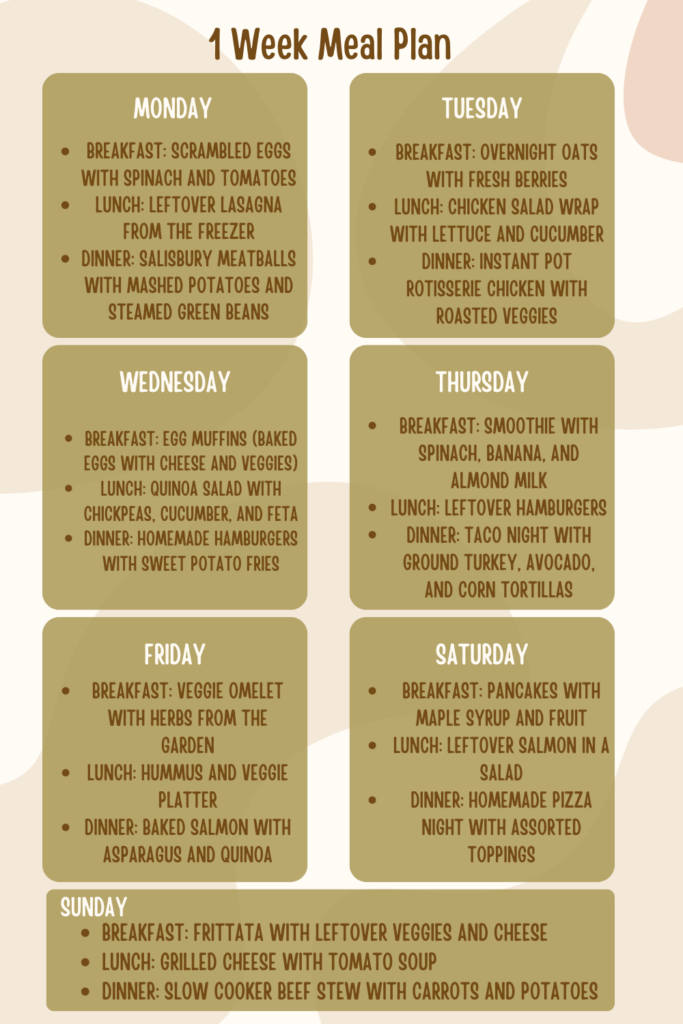The Importance of Meal Planning: A Comprehensive Guide for Busy Families
Introduction
In today’s fast-paced world, juggling work, family commitments, and daily responsibilities can often make meal preparation feel overwhelming. Many families, as a result, struggle with deciding what to cook, finding ways to minimize waste, and ensuring that nutritious meals are consistently available. This is where meal planning comes into play. By taking the time to plan meals ahead of time, families can not only save time but also reduce waste and promote healthier eating habits. In this article, we will explore the importance of meal planning, share a simple one-week meal plan, and provide practical tips for achieving success.
Why Meal Planning Matters
Saves Time
One of the primary benefits of meal planning is the significant amount of time it saves. When you take the initiative to outline meals for the week, you effectively eliminate the daily stress associated with deciding what to cook. Rather than rummaging through the fridge or pantry each evening, a well-structured meal plan allows you to prepare meals in bulk. As a result, this frees up valuable time for other family activities, allowing everyone to enjoy quality moments together.
Reduces Waste
In addition to saving time, meal planning also plays a crucial role in reducing food waste. By thoughtfully organizing your meals, you only purchase the ingredients you need. This practice decreases the likelihood of ingredients going unused and spoiling. Not only does this save you money, but it also contributes to a more sustainable lifestyle, making a positive impact on the environment.
Promotes Healthier Choices
Furthermore, having a meal plan in place enables families to focus on nutritious ingredients rather than succumbing to the temptation of unhealthy convenience foods. By planning meals ahead of time, you gain better control over the types of foods consumed, which leads to healthier choices and improved overall well-being for everyone in the family.
My Approach to Meal Prep
As a busy parent, I often find myself relying on freezer meals, crockpot dishes, and Instant Pot recipes. These methods provide the flexibility I need and can be prepared ahead of time, making them invaluable during particularly hectic weeks. Here’s how I typically structure my meal prep:
- Plan Ahead: At the beginning of each week, I take the time to outline our meals based on our family’s schedule. This proactive approach helps ensure that I account for busy nights or events.
- Prep Ingredients: I also make it a point to chop vegetables and marinate proteins whenever I have a moment. This pre-preparation significantly speeds up cooking on those busy nights.
- Use Kitchen Gadgets: Lastly, my crockpot and Instant Pot serve as lifesavers. They allow for hands-off cooking, which is particularly beneficial on evenings when I have other commitments.
By integrating these strategies into my routine, meal preparation becomes not only manageable but also enjoyable for the whole family.
One-Week Meal Plan Overview
Below is a simple one-week meal plan that incorporates wholesome, fresh ingredients. Each day includes breakfast, lunch, and dinner, ensuring a variety of meals that cater to different tastes.
Daily Breakdown
Day 1: Monday
- Breakfast: Scrambled eggs with spinach and tomatoes
- Lunch: Leftover lasagna from the freezer
- Dinner: Salisbury meatballs with mashed potatoes and steamed green beans
Day 2: Tuesday
- Breakfast: Overnight oats with fresh berries
- Lunch: Chicken salad wrap with lettuce and cucumber
- Dinner: Instant Pot rotisserie chicken with roasted veggies
Day 3: Wednesday
- Breakfast: Egg muffins (baked eggs with cheese and veggies)
- Lunch: Quinoa salad with chickpeas, cucumber, and feta
- Dinner: Homemade hamburgers with sweet potato fries
Day 4: Thursday
- Breakfast: Smoothie with spinach, banana, and almond milk
- Lunch: Leftover hamburgers
- Dinner: Taco night with ground turkey, avocado, and corn tortillas
Day 5: Friday
- Breakfast: Veggie omelet with herbs from the garden
- Lunch: Hummus and veggie platter
- Dinner: Baked salmon with asparagus and quinoa
Day 6: Saturday
- Breakfast: Pancakes with maple syrup and fruit
- Lunch: Leftover salmon in a salad
- Dinner: Homemade pizza night with assorted toppings
Day 7: Sunday
- Breakfast: Frittata with leftover veggies and cheese
- Lunch: Grilled cheese with tomato soup
- Dinner: Slow cooker beef stew with carrots and potatoes

Grocery List for One Week
To simplify your shopping experience, here’s a categorized grocery list based on the meal plan above:
Proteins
- Chicken breasts (4 for rotisserie chicken)
- Ground turkey (1 lb for tacos)
- Beef (1 lb for beef stew)
- Salmon fillets (2)
- Eggs (2 dozen)
- Cooked Salisbury meatballs (or ingredients to make them)
Vegetables
- Spinach (1 bag)
- Tomatoes (4-6)
- Green beans (1 lb)
- Mixed vegetables (for roasting)
- Sweet potatoes (2-3)
- Cucumbers (2)
- Avocado (2)
- Asparagus (1 bunch)
- Carrots (1 lb)
- Potatoes (4-6 for stew)
- Bell peppers (2)
Grains
- Whole grain bread (for sandwiches and toast)
- Corn tortillas (for tacos)
- Quinoa (1 lb)
- Pasta (for lasagna)
- Pizza dough (or ingredients to make it)
Dairy
- Cheese (for omelets and pizza)
- Milk or almond milk (for oatmeal and smoothies)
- Feta cheese (for quinoa salad)
Pantry Staples
- Olive oil
- Salt and pepper
- Onion powder
- Garlic powder
- Mayonnaise
- Fry seasoning or preferred spice mix
- Hummus (store-bought or homemade)
- Maple syrup (for pancakes)
- Tomato soup (canned or homemade)
Preparing Ahead: Tips for Success
Meal Prep Techniques
Batch Cooking: One effective strategy is to consider cooking larger portions of meals on weekends. By doing this, you can refrigerate or freeze meals for later use. Dishes like lasagna and beef stew work particularly well for batch cooking, as they reheat beautifully.
Freezer Meals: Another great option is to prepare and freeze meals such as chicken salad wraps and homemade pizzas. This approach makes it incredibly easy to grab a meal on busy nights when time is limited.
Utilize Leftovers: Additionally, you can get creative with leftovers by transforming them into new meals. For instance, leftover chicken can easily be turned into a refreshing salad or hearty sandwiches, allowing you to reduce waste while enjoying delicious food.
Involving the Family
Meal prep can also become a fun family activity! Involving your family not only makes the process more enjoyable but also teaches kids valuable cooking skills along the way. Consider assigning simple tasks, such as washing vegetables or setting the table, to create a sense of teamwork and connection around mealtime.
The Joy of Fresh Ingredients
Using fresh, high-quality ingredients can significantly impact your family’s health and well-being. Here are some compelling benefits to consider:
Nutritional Value: Fresh produce is often richer in vitamins and minerals compared to processed options, providing your family with the nutrients they need.
Flavor: Moreover, fresh ingredients enhance the taste of your meals, making them more enjoyable for everyone around the table.
Mindful Eating: Finally, preparing meals with whole foods fosters mindfulness around eating, which promotes healthier choices for your family.
Supporting Local
Whenever possible, make an effort to source ingredients from local farmers’ markets or community-supported agriculture (CSA) programs. Not only does this support local economies, but it also ensures that you’re getting fresher, seasonal ingredients that can elevate your meals.
Conclusion: Embracing the Meal Prep Journey
In the hustle and bustle of life, prioritizing home-cooked meals that bring both nourishment and joy is absolutely essential. By following this simple one-week meal plan, you can create a routine that balances your busy schedule with the desire to feed your family wholesome, delicious food.
Remember, meal planning doesn’t have to be overwhelming. Instead, take it one step at a time, involve your family, and enjoy the cooking process together. With a little organization and creativity, you can successfully nourish your loved ones while effectively managing the demands of a busy household. Happy cooking!
Previous Post
Next Post
Keep Reading
blog home
SEARCH
What do you want to learn today?
trending searches
living mindfully
self care
recipes
toxin free
minimalism
DIY

+ Show / Hide Comments
Share to: